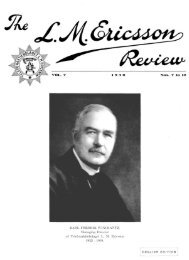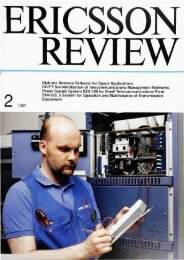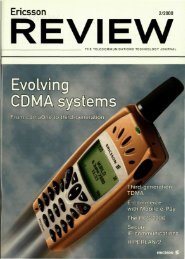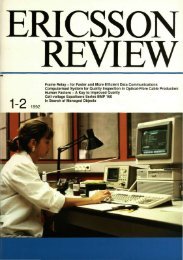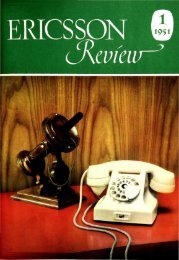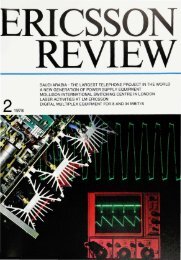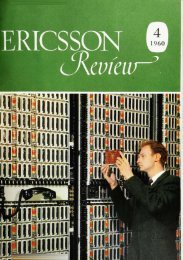11 - ericssonhistory.com
11 - ericssonhistory.com
11 - ericssonhistory.com
You also want an ePaper? Increase the reach of your titles
YUMPU automatically turns print PDFs into web optimized ePapers that Google loves.
Signalling in L M Ericsson Telex System<br />
E. STRINDLUND & C. PAULSSON, TE LEFON AKTIE BOL AG ET L M ERICSSON, STOCKHOLM<br />
UDC 621.394.63<br />
621.394.34<br />
LME 815 831<br />
Signalling occurs in a telex network in conjunction with the setting up and<br />
clearing of connections between exchanges and takes place, respectively, before<br />
and after the transmission of information between the connected subscribers.<br />
An account is given below of the signalling principles used in L M<br />
Ericsson's telex system within the framework of the CCITT re<strong>com</strong>mendations<br />
for establishing, supervising, clearing and charging national, international<br />
and intercontinental telex connections. The signalling used in national networks<br />
may be characterized as CCITT Type B with keyboard selection and<br />
printed service signals. International and intercontinental exchanges have<br />
equ.pment for Type A, Type B, Type C Table II and U 20 signalling.<br />
L M Ericsson Telex System<br />
The system <strong>com</strong>prises the following types of exchanges:<br />
• National terminal exchanges type ARB <strong>11</strong>1<br />
• National transit exchanges type ARM 201 and ARM 503<br />
• International transit exchanges type ARM 201<br />
• Intercontinental transit exchanges type ARM 201<br />
Fig. 1 shows how a national network can be built up with these types of<br />
exchanges.<br />
ARB<br />
Fig. 1<br />
Telex network<br />
International transit exchange ARM — ARB I <strong>11</strong><br />
National transit exchange ARM 201 or ARM 503 :<br />
ARB <strong>11</strong>1<br />
Terminal exchange ARB III<br />
Remote or local subscriber<br />
2



